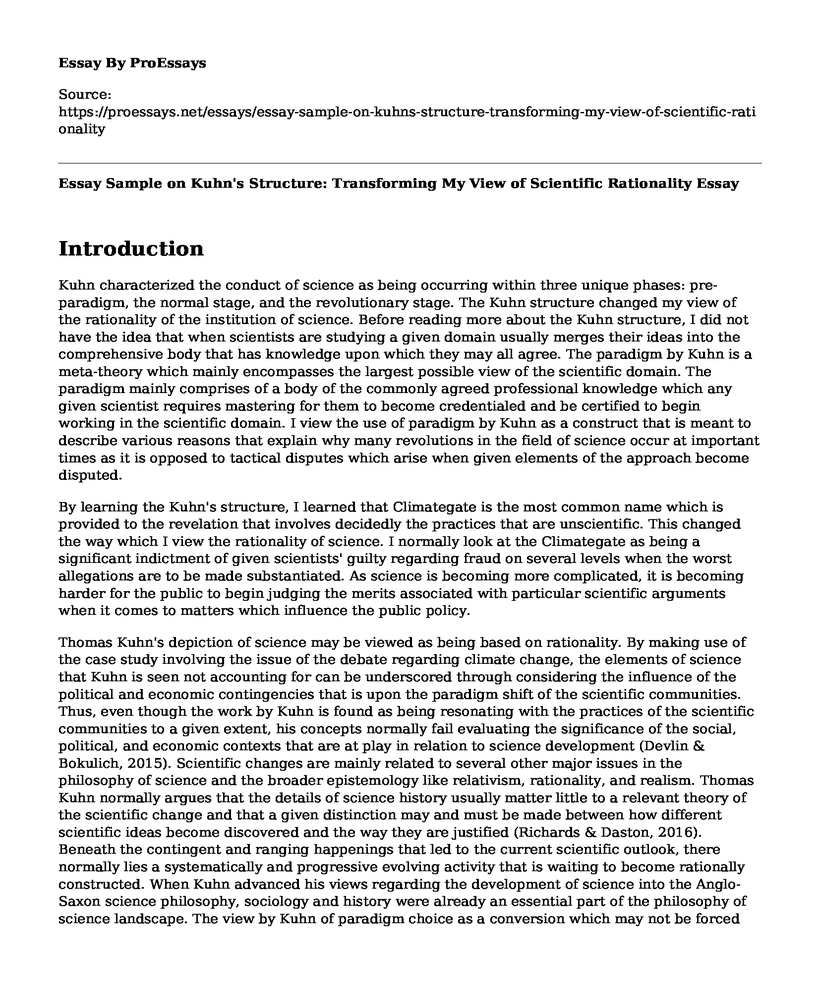Introduction
Kuhn characterized the conduct of science as being occurring within three unique phases: pre-paradigm, the normal stage, and the revolutionary stage. The Kuhn structure changed my view of the rationality of the institution of science. Before reading more about the Kuhn structure, I did not have the idea that when scientists are studying a given domain usually merges their ideas into the comprehensive body that has knowledge upon which they may all agree. The paradigm by Kuhn is a meta-theory which mainly encompasses the largest possible view of the scientific domain. The paradigm mainly comprises of a body of the commonly agreed professional knowledge which any given scientist requires mastering for them to become credentialed and be certified to begin working in the scientific domain. I view the use of paradigm by Kuhn as a construct that is meant to describe various reasons that explain why many revolutions in the field of science occur at important times as it is opposed to tactical disputes which arise when given elements of the approach become disputed.
By learning the Kuhn's structure, I learned that Climategate is the most common name which is provided to the revelation that involves decidedly the practices that are unscientific. This changed the way which I view the rationality of science. I normally look at the Climategate as being a significant indictment of given scientists' guilty regarding fraud on several levels when the worst allegations are to be made substantiated. As science is becoming more complicated, it is becoming harder for the public to begin judging the merits associated with particular scientific arguments when it comes to matters which influence the public policy.
Thomas Kuhn's depiction of science may be viewed as being based on rationality. By making use of the case study involving the issue of the debate regarding climate change, the elements of science that Kuhn is seen not accounting for can be underscored through considering the influence of the political and economic contingencies that is upon the paradigm shift of the scientific communities. Thus, even though the work by Kuhn is found as being resonating with the practices of the scientific communities to a given extent, his concepts normally fail evaluating the significance of the social, political, and economic contexts that are at play in relation to science development (Devlin & Bokulich, 2015). Scientific changes are mainly related to several other major issues in the philosophy of science and the broader epistemology like relativism, rationality, and realism. Thomas Kuhn normally argues that the details of science history usually matter little to a relevant theory of the scientific change and that a given distinction may and must be made between how different scientific ideas become discovered and the way they are justified (Richards & Daston, 2016). Beneath the contingent and ranging happenings that led to the current scientific outlook, there normally lies a systematically and progressive evolving activity that is waiting to become rationally constructed. When Kuhn advanced his views regarding the development of science into the Anglo-Saxon science philosophy, sociology and history were already an essential part of the philosophy of science landscape. The view by Kuhn of paradigm choice as a conversion which may not be forced through neutral and logic experience made Kuhn view choice has been a matter of devoid of the rational elements. However, Kuhn greatly put emphasize that even if paradigm choice may not become justified through proof, it does not necessarily mean that major arguments are not appropriate or that several scientists are not persuaded in a rational manner to change their minds.
The history of science normally threatens science's claim of finding the truths that concern reality or the regulations of nature. Most of the early work regarding conceptual change greatly put emphasize on the discontinuous character regarding important changes through making use of metaphors such as gestalt switch, thereby indicating that such kind of major changes usually happens all at once. This particular idea had been introduced by Thomas Kuhn. Instead of making of dramatic gestalt shifts, it would be equally plausible given that for historical actors there normally exist the micro-processes in the conceptual development. Thus, the science development can take place stepwise having minor changes although it would still add to something which appears as been revolutionary to historian looking backward and comparing the original conceptual paradigms to end product of the subsequent changes.
Conclusion
My mind has not changed with certain claims by Kuhn. Kuhn's position regarding the approach choice can be rendered as been unacceptable given that it rests much on too radical claims concerning lack of the ability to translate from a given paradigm to another. Kuhn's philosophy regarding science usually denies the science's rationality given the fact that science should serve as the only model of what it entails to believe concerning the natural world.
References
Devlin, W. J., & Bokulich, A. (Eds.). (2015). Kuhn's Structure of Scientific Revolutions-50 years on (Vol. 311). Springer.
Richards, R. J., & Daston, L. (Eds.). (2016). Kuhn's' Structure of Scientific Revolutions' at Fifty: Reflections on a Science Classic. University of Chicago Press.
Cite this page
Essay Sample on Kuhn's Structure: Transforming My View of Scientific Rationality. (2023, Jan 18). Retrieved from https://proessays.net/essays/essay-sample-on-kuhns-structure-transforming-my-view-of-scientific-rationality
If you are the original author of this essay and no longer wish to have it published on the ProEssays website, please click below to request its removal:
- Lab Report Example: Modeling Radioactive Decay
- History Essay Example on Cuban Revolution
- Challenges Facing Dubai - Research Paper Summary
- Biography of Isaac Newton
- Essay Example on Force: The Key to Electric Power Generation
- Bernoulli's Principle for Flow of Fluids: Entrainment, Velocity Measurement, & More - Essay Sample
- Chemical Industries: Properties, Uses, Hazards, and Safety Measures - Essay Sample







